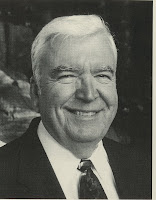 It was with great sadness this weekend that I learned of the passing of 80-year-old Bernard Goldstein, a lifelong family friend, former client, and business mentor. Under Bernie’s leadership, Alter Companies grew from a single scrap operation to one of the nation’s largest privately held networks of scrap yards, a global scrap metal brokerage, and a national barge line. After a 40-year career at Alter, Bernie became founder and CEO of Isle of Capri Casinos, a pioneering feat that earned him the title “Father of Riverboat Gaming.”
It was with great sadness this weekend that I learned of the passing of 80-year-old Bernard Goldstein, a lifelong family friend, former client, and business mentor. Under Bernie’s leadership, Alter Companies grew from a single scrap operation to one of the nation’s largest privately held networks of scrap yards, a global scrap metal brokerage, and a national barge line. After a 40-year career at Alter, Bernie became founder and CEO of Isle of Capri Casinos, a pioneering feat that earned him the title “Father of Riverboat Gaming.”
Though Bernie won countless national awards for business, education, and community service, I always felt that the award he cherished the most was his 1999 induction into the National Rivers Hall of Fame. Bernie described the influence that the Mississippi River had on his life in Navigating the Century: A Personal Account of Alter Company’s First Hundred Years (published by The History Factory in 1998): “I remember riding down to the Mississippi River on my bicycle, taking the Quinlan Ferry to Davenport, and on two occasions taking the excursion boats to Muscatine and back. My lifelong love for the river was born then, an endearment that influenced Alter’s entry into the barge line business and later into riverboat gaming.”
Bernie was a unique businessman. Trained as a lawyer, he was extremely thorough, calculated, and highly disciplined in business strategy and execution. He hired the best and brightest. He worked them extremely hard. They were highly compensated. And they were fiercely loyal.
Bernie was driven by an almost mystical fascination and belief in the transformative power of the river. For him, the river was more than a simple metaphor for flows and currents. He saw it as a complex integrated system of geography, culture, and commerce. In 1956, after noticing increased barge traffic on the Mississippi, he wondered why it couldn’t be put to use for hauling scrap metal. The next year he trucked his first load of scrap to the Davenport seawall and loaded a barge bound for Laclede Steel just north of St. Louis.
The river not only provided Alter an efficient method of transportation, it also geographically expanded the markets to which Alter could sell. But Alter’s established manufacturing customers were threatened by the company’s mobility—and the potential pricing advantages it brought—so they forced the area’s barge lines to raise their rates. In response—and undeterred by the fact that he could barely find a bank in the country who would fund his endeavor—Bernie went into the barge business.
The obstacles brought by entry into the barge business were simply a warm-up for the formidable regulatory, financial, and cultural hurdles Bernie had to clear to open the nation’s first riverboat casino. In the early 1990s, recognizing that many of the once industrial river towns were suffering from a lack of new, sustainable sources of revenue, Bernie began lobbying Iowa legislators to license riverboat gaming. At 7:45 a.m. on April 1, 1991, the first riverboat casino in modern American history, the M/V Diamond Lady, sailed from Bettendorf, Iowa. Once again, Bernie’s strategy was like the lyrics of “Old Man River”—the Kern and Hammerstein tune of which he was so fond—“He don’t say nothin,’ but he must know somethin,’ cause he just keeps rollin,’ he keeps rollin’ along.”
Although he was a thoroughly modern businessman, Bernie Goldstein shared a defining attribute with many of the industrial pioneers of the 19th century. He never saw himself as a risk taker. Bernie Goldstein’s steadfast belief in “the river” enabled him to see opportunities that most never saw, and then capitalize on them because he believed it was his destiny. I feel privileged to have witnessed such a vision in action.
